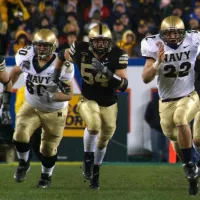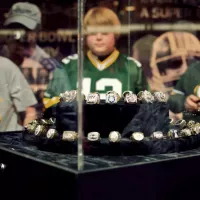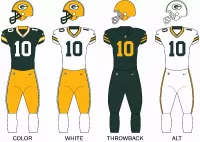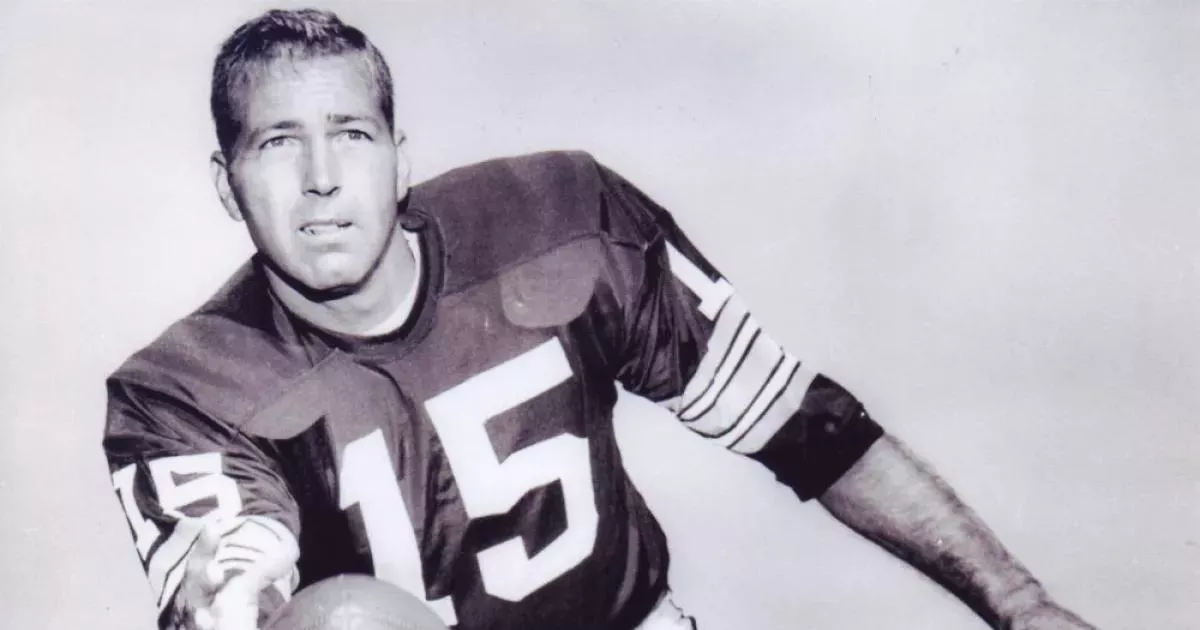Bart Starr was a legendary quarterback for the Green Bay Packers, playing from 1956 to 1971. He achieved the unique distinction of leading his team to three consecutive NFL championships (1965-1967) and victories in the first two Super Bowls. Despite his success as a player, his tenure as the Packers' head coach from 1975 to 1983 was less remarkable, resulting in a losing record.
1910: Birth of Bart Starr's Father
Benjamin Bryan Starr, Bart Starr's father, was born in 1910.
1916: Birth of Bart Starr's Mother
Lula (Tucker) Starr, Bart Starr's mother, was born in 1916.
1933: The NFL Playoff System is Instituted
In 1933, the NFL instituted a playoff system, a significant event in the league's history.
January 9, 1934: Bart Starr's Birth
On January 9, 1934, Bryan Bartlett Starr, later known as Bart Starr, was born.
1942: Bart Starr's Father's Deployment
Bart Starr's father was deployed to the Pacific Theater in 1942 after his reserve unit was activated.
1946: Death of Bart Starr's Brother
In 1946, Bart Starr's younger brother, Hilton, tragically passed away from tetanus after stepping on a dog bone.
1953: Successful Season and Cotton Bowl Appearance
Bart Starr excelled during his sophomore year at Alabama in 1953, leading the team as the starting quarterback, safety, and punter. His punting average ranked second nationally, and he helped Alabama reach the Cotton Bowl, although they lost the game.
May 1954: Marriage to Cherry Morton
Bart Starr and Cherry Morton eloped in May 1954, keeping their marriage secret to protect Starr's college football scholarship.
1956: Start of NFL Career
Bart Starr's NFL journey began in 1956 as a backup quarterback for the Green Bay Packers.
1956: Drafted by the Green Bay Packers
In 1956, Bart Starr was drafted by the Green Bay Packers in the 17th round of the NFL draft.
1956: Preparation for Rookie Season
In preparation for his rookie season with the Packers in 1956, Starr dedicated himself to training, even resorting to throwing footballs through a tire in his in-laws' backyard.
1959: Vince Lombardi's Arrival and Starting Role
With Vince Lombardi's arrival as head coach in 1959, Bart Starr eventually earned the starting quarterback position, marking a turning point in his career.
1960: First NFL Championship Game Appearance
Bart Starr led the Packers to the NFL Championship Game in 1960, but they faced a loss against the Philadelphia Eagles, Lombardi's only postseason defeat as a head coach.
1961: First Full Season as Starting Quarterback and Championship Victory
In 1961, Bart Starr thrived in his first full season as the Packers' starting quarterback, leading them to an 11-3 record and a dominant victory in the NFL Championship Game against the New York Giants.
1962: Continued Success and Second Championship
Bart Starr and the Packers continued their winning streak in 1962, securing a 13-1 record and their second consecutive NFL Championship victory, solidifying their dominance in the league.
1963: Injury Shortened Season
Injuries hampered Bart Starr's performance in 1963, limiting his playing time and hindering the Packers' pursuit of a fourth consecutive NFL Championship appearance.
1964: Shift to Passing Offense and Impressive Performance
With the running game facing challenges in 1964, the Packers' offense shifted focus towards passing, and Bart Starr stepped up, delivering an impressive season with a league-leading 97.1 passer rating.
1965: Overcoming Injury for Championship Win
Despite suffering a rib injury in the playoff game against the Baltimore Colts, Bart Starr returned to lead the Green Bay Packers to victory in the 1965 NFL Championship Game against the Cleveland Browns.
1965: Co-founding of Rawhide Boys Ranch
In 1965, Bart Starr and his wife, Cherry, co-founded the Rawhide Boys Ranch in New London, Wisconsin. This facility was created to provide support and assistance to at-risk and troubled boys across Wisconsin.
1965: Start of Three Consecutive Championships
The year 1965 marked the beginning of the Green Bay Packers' streak of three consecutive league championships under the leadership of Bart Starr.
1966: League MVP Award
Bart Starr received the NFL's Most Valuable Player award in 1966.
1966: One of Starr's Best Seasons
In 1966, Bart Starr had one of his most successful seasons, achieving career highs and leading the Packers to victory in the NFL Championship and the first Super Bowl.
1967: Super Bowl II Victory and Lombardi's Farewell
In 1967, Starr led the Packers to victory in Super Bowl II, marking their third consecutive NFL title and coach Lombardi's last game with the team.
1967: A Challenging Season and the Ice Bowl
In 1967, despite a hand injury affecting his performance, Starr and the Packers persevered, winning the NFL Championship Game, known as the Ice Bowl, with a gutsy quarterback sneak play.
1967: End of Three Consecutive Championships
The Green Bay Packers, led by Bart Starr, concluded their run of three straight league championships in 1967.
1967: A Long Time Coming
The Packers' playoff victory in 1983 was their first home playoff game since 1967.
January 1968: Starr Considers Retirement
In January 1968, Bart Starr contemplated retiring but chose to stay with the Packers.
1969: Battling Injuries
In 1969, Starr continued to battle injuries while playing for the Packers.
1969: Peak Passing Years
The period from 1964 to 1969 marked Bart Starr's most prolific years in terms of passing, showcasing his evolution as a quarterback and the Packers' offensive strategy.
October 17, 1970: Presidential Recognition for Starr
On October 17, 1970, President Richard Nixon honored Bart Starr at a reception, recognizing his contributions to football and highlighting the Packers' dominance in the 1960s.
1970: Starr's Final Touchdowns
In 1970, Starr played a full season but his performance showed signs of decline; these were the last touchdown passes of his career.
August 1971: Starr's Career-Threatening Surgery
In August 1971 Starr underwent surgeries on his throwing arm that almost proved fatal and ultimately led to the end of his playing career.
1971: Establishment of the Vince Lombardi Cancer Foundation
Bart Starr and his wife, Cherry, established the Vince Lombardi Cancer Foundation in 1971. This foundation aimed to raise funds for cancer research and care as a tribute to his former coach, Vince Lombardi.
1971: Retirement as a Player
Bart Starr retired from playing professional football in 1971.
1971: End of an Era: Starr's Playing Career Concludes
Bart Starr's playing career ended in 1971, leaving behind a legacy as one of the game's best.
February 1972: Starr Prepares for One Last Year
In February 1972, Bart Starr was preparing for potentially his final year as a player.
July 1972: Starr Announces Retirement
In July 1972, due to the irreparable damage to his throwing arm, Bart Starr announced his retirement from professional football.
1972: From Player to Coach
Immediately after retiring as a player, Starr transitioned to coaching, serving as the Packers' quarterbacks coach and leading them to win the NFC Central division title.
1972: Retirement and Record Completion Percentage
Upon retiring in 1972, Bart Starr held the NFL record for career completion percentage at 57.4%.
1973: Golden Plate Award Recipient
Bart Starr received the Golden Plate Award from the American Academy of Achievement in 1973.
1974: Starr Becomes Head Coach
Starr was hired as the head coach of the Packers in 1974, acknowledging the challenges that came with transitioning from a Hall of Fame player to a successful coach.
1975: Beginning of Head Coaching Career
Bart Starr embarked on his journey as the Green Bay Packers' head coach in 1975.
1977: Induction into Hall of Fame
Both the Pro Football Hall of Fame and the Packers Hall of Fame inducted Bart Starr as a member in 1977.
1977: inducted into the Green Bay Packers Hall of Fame
Starr was recognized for his contributions to the Green Bay Packers with his induction into the team's Hall of Fame.
1981: Forrest Gregg's Super Bowl Run
Forrest Gregg, Starr's former teammate and successor, led the Cincinnati Bengals to Super Bowl XVI in 1981.
1981: Inducted into the Wisconsin Athletic Hall of Fame
In 1981, Starr was inducted into the Wisconsin Athletic Hall of Fame, a testament to his impact on sports in his home state.
1982: A Challenging Coaching Tenure
Despite some successes, Starr's time as head coach was challenging, and he was eventually replaced.
January 8, 1983: Packers' First Playoff Appearance in a Decade
On January 8, 1983, the Packers, led by coach Starr, secured their first playoff berth in ten years, marking a significant moment in his coaching career.
1983: End of Head Coaching Career
In 1983, Bart Starr's tenure as the head coach of the Green Bay Packers came to an end.
January 13, 1984: Starr and the Arizona Firebirds
On January 13, 1984, Starr was named head coach of the Arizona Firebirds, a proposed NFL expansion team. The team was never granted by the NFL.
1985: Death of Bart Starr's Father
The year 1985 marked the passing of Benjamin Bryan Starr, Bart Starr's father.
1988: Death of Bret Starr
In 1988, Bart Starr's younger son, Bret, tragically passed away at the age of 24 due to a drug overdose.
1988: Phoenix Gets a Team
The NFL did not grant the Firebirds ownership group a team, but Phoenix was later awarded the Cardinals in 1988.
1995: Death of Bart Starr's Mother
Bart Starr's mother, Lula (Tucker) Starr, passed away in 1995.
2003: End of Franchise Record for Games Played
Bart Starr's franchise record for the Green Bay Packers, holding the most games played at 196, stood until 2003.
2014: Stroke
Bart Starr experienced a serious stroke in 2014, which significantly impacted his health in his later years.
June 2015: Stem-Cell Therapy Treatment
In June 2015, Bart Starr's family revealed that he was undergoing stem-cell therapy as part of a clinical trial.
November 26, 2015: Attendance at Brett Favre's Jersey Retirement
Despite undergoing stem-cell therapy, Bart Starr attended the ceremony at Lambeau Field on November 26, 2015, where QB Brett Favre's jersey number was retired.
February 2016: Super Bowl 50 MVP Ceremony
While Bart Starr was unable to attend Super Bowl 50 due to health reasons, the NFL honored him and other Super Bowl MVPs during a pregame ceremony.
2017: Ice Bowl Packers Reunion
Bart Starr participated in a fall 2017 reunion with his former teammates from the Ice Bowl Packers.
2018: Renaming of the NFL Man of the Year Award
Previously known as the Byron "Whizzer" White NFL Man of the Year Award, the honor was renamed in the fall of 2018 to the Alan Page Award.
May 26, 2019: Bart Starr's Death
Bart Starr passed away on May 26, 2019.
2019: Continued Involvement with Rawhide Boys Ranch
As of 2019, Cherry and Bart Jr. continued to be active spokespersons for Rawhide Boys Ranch, maintaining frequent communication and support for the organization.
Mentioned in this timeline

Brett Favre is a retired NFL quarterback renowned for his...

College football is a popular amateur sport in the United...

The Super Bowl is the annual championship game of the...
Arizona is a landlocked state in the Southwestern U S...

The Green Bay Packers are an NFL team based in...

Football is a family of team sports primarily involving kicking...
Trending
2 months ago Dylan O'Brien Stars in Sam Raimi's Outrageous Horror Comeback, 'Send Help'
7 months ago Inter Milan Prepares for Club World Cup 2025 Amidst Monterrey Challenge

Harold Landry III is an American football linebacker currently playing for the Tennessee Titans in the NFL He was drafted...

6 months ago Seranthony Domínguez traded to Blue Jays from Orioles; Watts-Brown to Baltimore.
3 months ago Ohio State Dominates Wisconsin, Adding to Fickell's Challenges; Players Discuss Victory

3 months ago Dakota Johnson's Epic Response to 'Naked Dress' Queries and Red Carpet Fashion
Popular

Thomas Douglas Homan is an American law enforcement officer who...

Martin Luther King Jr was a pivotal leader in the...

XXXTentacion born Jahseh Dwayne Ricardo Onfroy was a controversial yet...

Instagram is a photo and video-sharing social networking service owned...

KFC or Kentucky Fried Chicken is an American fast-food chain...

Jupiter is the fifth and largest planet from the Sun...
